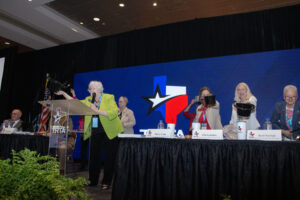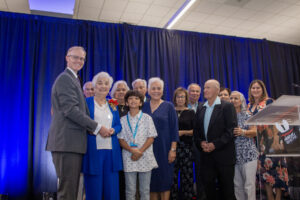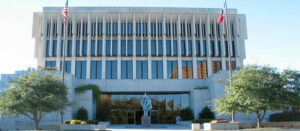Today, April 7, the House Pensions, Investments, and Financial Services (PIFS) Committee met to discuss several bills impacting the Teacher Retirement System of Texas (TRS) and TRS retirees. The Texas Retired Teachers Association (TRTA) thanks PIFS Chairman Rafael Anchia for designating today to focus on these important bills that could impact our dedicated public education retirees’ livelihoods for years to come.
You can view a recording of the meeting online here.
TRTA also received an outpouring of support from the Texas Senate during a reading of the resolution honoring Texas retired public educators, SR 129, which was sponsored by Sen. Bryan Hughes. The Senate’s overwhelming response to the resolution is available here.
The Senate Finance Committee held a hearing on SB 288 by Sen. Kel Seliger. This bill is identical to HB 2109 by Rep. Gene Wu and reforms penalties for violations of return-to-work limits. TRTA testified in support of the bill and thanks Sen. Seliger for filing the bill. The Finance committee voted the bill out of committee and sent it to the full Senate today.
Tomorrow, the Senate Education Committee will meet and hear testimony on SB 1356. This bill helps provide opportunities for high-impact tutoring with our Texas schools and TRS retirees. TRTA supports this endeavor, as the TRTF Tutor Program launched in 2020. TRTA has been working with state leaders to bring the program in alignment with what schools are doing with high-impact tutoring.
Bill Summary
The following bills were heard in committee today:
- HB 672 Martinez | et al. Relating to cost-of-living (COLA) increases applicable to benefits paid by the Teacher Retirement System of Texas. This bill would use the Consumer Price Index (CPI) to grant an inflation-based COLA every year. The TRS Board of Trustees would determine each year if the amount based on CPI is possible while keeping the system actuarially sound. If the amount does not accomplish that goal, the Board would be able to adjust the amount to whatever is possible while staying sound. The bill was left pending in committee.
- HB 1124 Muñoz, Jr. | et al. Relating to a cost-of-living adjustment applicable to certain benefits paid by the Teacher Retirement System of Texas, including a related study. If passed, the bill would grant a 3 percent COLA capped at $100 for retirees who retired between August 31, 2004 and August 31, 2015. The bill would include a feasibility study on future COLAs, conducted by TRS and due to Legislature in September 2022. The bill was left pending in committee.
- HB 1846 Allen | et al. Relating to benefits paid by the Teacher Retirement System of Texas. The bill would provide a one-time adjustment of 10 percent for all retirees and would also provide a 4 percent annual COLA. It would also include a supplemental payment capped at $2000 payable in January 2022. The bill was left pending in committee.
- HB 2022 Darby | et al. Relating to enrollment of certain retirees in the Texas Public School Employees Group Insurance Program. Referred to as the “golden ticket” bill, if passed, it would allow a window for Medicare-eligible TRS members who left TRS-Care between January 1, 2017 and December 31, 2019 to return to the health insurance program, giving them until 2023 to decide. The bill was left pending in committee.
- HB 2109 Wu Relating to preventing the loss of benefits by certain retirees of the Teacher Retirement System of Texas who resume service. The bill would change penalties for return-to-work provisions from current law where a retiree loses a whole pension to a three strikes penalty structure: 1. a warning, 2. a dollar-for-dollar payback of the amount they made from the school district, and 3. loss of monthly pension. The bill was left pending in committee.
- HB 3207 Herrero Relating to preventing the loss of benefits by certain retirees of the Teacher Retirement System of Texas who resume service during a declared disaster. The bill would exempt retirees from return-to-work laws in school districts that are within a declared disaster area by the Governor for the duration of the disaster declaration. The bill was left pending in committee.
- HB 3214 Capriglione | et al. Relating to a cost-of-living adjustment applicable to certain benefits paid by the Teacher Retirement System of Texas. The filed version has a 6 percent COLA (capped at $100 per month) to provide a higher COLA for retirees with lower pensions. The retirement date range of the COLA in this version of the bill is August 31, 2004 to August 31, 2021. A committee substitute would change the dates to cover TRS retirees who retired before August 2019. The bill was left pending in committee.
- HB 3507 Rogers | et al. Relating to a one-time supplemental payment of benefits under the Teacher Retirement System of Texas. If passed, the bill would provide a supplemental payment of up to $2,400 for all TRS retirees, which would be payable in September 2022. The bill was left pending in committee.
- HB 3787 Dean Relating to the loss of benefits by and the payment of certain employer contributions for certain retirees of the Teacher Retirement System of Texas who resume service. A more detailed description is available in Bill Testimony below. The bill was left pending in committee.
Bill Testimony
The Texas Retired Teachers Association’s (TRTA) Executive Director Tim Lee provided testimony on the bills today. He thanked Chairman Anchia for including TRS bills on the day’s agenda and recognizing retirees’ commitment to the state.
Lee testified in favor of HB 672, which he noted is a creative solution to providing retirees with a pension increase while continuing to keep the TRS pension fund actuarially sound.
He also testified in favor of Representative Rep. Alma Allen’s bill, HB 1846.
Allen stated when laying out her bill “As a former educator, this is an important issue to me,” adding that she has seen retirees suffer as costs increase while their pensions do not. She said that retired educators “dedicated their whole lives to you, to me, and thousands of children . . . honor your teachers.”
Tim Lee said, “Dr. Allen is a hero in my book.” He told committee members that 130,000 current TRS retirees earn $1,000 per month or less, adding “that’s who (Dr. Allen) is thinking about with her bill.”
Rep. Abel Herrero presented his bill, HB 3207, which he said “prevents TRS from withholding monthly benefit payments if a retiree works temporarily in a school district where a disaster has been declared.” The bill would include not only retired teachers, but also auxiliary personnel such as bus drivers.
Tim Lee testified in favor of the bill, saying it’s a “creative solution for retirees who want to help schools.”
TRS Executive Director Brian Guthrie testified as a resource witness. When asked why the penalty is in place by Chairman Anchia, Guthrie said, “This (issue) dates back to 2005…employment after retirement rules were changed to discourage behavior.” Specifically, at that time, many school employees would retire as soon as eligible then immediately return to work in the same position, which caused financial problems for the pension fund.
HB 3207, if passed, would have no significant financial impact on the TRS pension fund, per Guthrie. Guthrie added that during next week’s TRS Board of Trustees meeting, staff will be asking the TRS Board to adopt an emergency rule to allow any retiree to come back to work this summer without penalty.
When laying out HB 2109, Rep. Gene Wu explained that TRS retirees may not be told by their employers that they have exceeded their allotted work time for the month. As soon as a retiree is over the limit, the penalty must be assessed—current law allows for no exceptions.
Wu also said that there is a significant delay in when TRS becomes aware of the violation. The retiree may not know about the penalty for several months and end up with a huge fine they cannot afford to pay. The total number of retirees this affects every year is around 500. This bill would create a warning system.
“These are people who spent their entire lives working to educate our state…they deserve more justice,” said Wu. The problem is significant in rural areas. Wu predicts the problem could get worse this summer due to COVID learning loss and the school districts’ needs for additional help.
Tim Lee testified in favor of the bill, saying TRTA members are very interested in this issue. “If you’re living on the margins and you’re returning to work to earn a little extra income….to lose your entire monthly annuity—it hurts!” Lee said.
This bill would alert not only the retiree of a pending violation, but the school district as well, allowing time for correction before a severe penalty is issued.
Rep. Drew Darby laid out his bill, HB 2022, sharing that the TRS-Care health insurance program underwent drastic changes in 2017, prompting many retirees to make a hard decision about whether or not to leave TRS-Care due to financial concerns within a limited period of time.
“The Legislature was trying to do some good” in changing TRS-Care, said Darby, “but we caught some folks in an area where they felt unprepared and rushed to make a decision.”
Tim Lee testified in favor of the bill, saying retirees made decisions before they had a complete picture. They lost access to a program they paid into their entire career in this one moment.
HB 3787, laid out by author Rep. Jay Dean, would change four things in current TRS return-to-work laws:
- Change the exemption date for full-time employment from 2001 to January 1, 2021 so that anyone who retired before that date can work full-time with no penalty (this has no actuarial cost to the system because it only affects those already retired).
- Exempt retirees who work for a non-profit, online tutoring program from return-to-work laws that may affect them because of third-party contractor laws. This could be revised to exempt retirees who work for the TRTF Tutor Program.
- Replace current return-to-work penalties with the three strikes system (Wu bill).
- Eliminate the pension surcharge paid by districts for retirees who work more than half-time, while keeping the TRS-Care surcharge, which is $535 per month currently. This change concerned the TRS actuary, who said it will add three years to the system’s funding period.
Tim Lee testified in favor of the bill, adding how significant it is for the Texas Retired Teachers Foundation (TRTF), TRTA’s charitable arm, which has been working on the TRTF Tutor Program for more than a year and would like to arrange contracts with school districts to provide free tutoring hours.
TRTA commends Rep. Jay Dean for taking many of the current return-to-work pain points that impact TRS retirees and codifying them into one succinct approach. The measure to all current retirees who retired on or before Dec. 31, 2020 the opportunity to return to work with no penalty is exceptionally well designed and would help thousands of current TRS retirees.
Rep. Sergio Munoz, Jr. clarified that his bill, HB 1124, would provide a 3 percent COLA to TRS retirees who did not receive one as a result of the passage of Senate Bill 1458 in 2013.
Tim Lee testified in favor of the bill, saying “the TRS pension trust fund is actuarially sound—a remarkable achievement by all involved.” He also said that in 2013, the COLA went “as far as we could go” while keeping the fund sound.
Lee said important considerations for providing any COLA for TRS retirees include how many years of amortization it adds to the pension fund and the COLA’s actual annual cost to the fund.
Rep. Giovanni Capriglione, author of HB 3214, said his bill includes a committee substitute that would adjust his proposed 6 percent COLA to include any TRS retiree who retired before August 31, 2019.
Capriglione provided both passionate and logical testimony, saying “We have retirees today who are living on almost next to nothing.” He added that the COLA is “equivalent to less than .3 percent of the fund’s value,” or about one-third of what is paid to TRS investment managers to run the fund.
“We have been able to get this fund so it can pay itself off in 26 years,” Capriglione added. “What we want to do is get under 31—this bill goes from 26 to 29 years.”
He continued, saying if the Legislature waited until the funding period was zero years, they would be “asking our retirees who are in their 60s, 70s, or 80s to wait 26 years to get a small bump.”
Tim Lee testified in favor of the bill, adding that “there is no general revenue cost tied to this.” The cost to fund the COLA comes from the pension fund itself.
“We’re in a blessed period of time when we can do this. Will we be able to do this two years from now? I don’t know,” Lee said.
That is why TRTA fully supports providing a COLA for retirees this session, while we know the fund is financially capable of supporting the cost.
Rep. Glenn Rogers laid out his bill, HB 3507, stating that his mother was a high school history teacher. The bill would provide a one-time supplemental payment, also known as a 13th check, for TRS retirees, capped at $2,400. Rogers added that the monthly average annuity for TRS retirees is just $2,118.
TRTA Legislative Committee Chair Nancy Byler testified in favor of the bill. Byler’s touching testimony included two stories of retirees she had met who used their thirteenth checks in 2019 to pay for dentures and to fill their propane tank for the winter.
“If you think what you do is not important to retirees, you’re wrong…what you do is important to them,” Byler added. “What you do today and what comes out of this session will impact retirees for their rest of this lives, not just one day.”
Thank You!
Thank you for being a member of TRTA! Be sure to download the TRTA app to receive all of the latest legislative updates.




